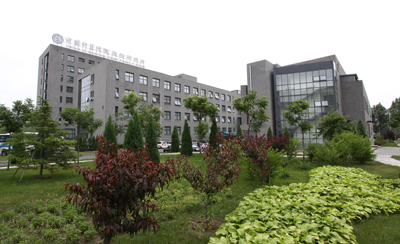微生物所坚持“微生物、高科技、大产业”的战略定位,致力于成为微生物领域重要的国家战略科技力量,面向世界科技前沿、人民生命健康和经济社会可持续发展,针对具有战略意义的微生物类群,围绕微生物多样性及资源深度挖掘和病原微生物感染免疫与关键防控技术,开展前瞻性、战略性的基础研究和关键技术研究,努力促进基础理论和关键核心技术突破,带动新兴产业发展,为实现高水平科技自立自强做出重要贡献。
微生物所设有微生物资源前期开发国家重点实验室、真菌学国家重点实验室、植物基因组学国家重点实验室(与中国科学院遗传与发育生物学研究所共建)、中国科学院微生物生理与代谢工程重点实验室、中国科学院病原微生物与免疫学重点实验室五个重点实验室。2020年2月,依托微生物所成立了中国科学院农业微生物先进技术工程实验室。同时设有微生物资源与大数据中心、技术转移转化中心、生物安全与动物实验公共平台、所级公共技术中心等技术支撑平台和一个专业性图书馆。依托微生物所还建设有中国科学院—发展中国家科学院生物技术卓越中心、中国科学院—发展中国家科学院新发突发传染病研究与交流卓越中心和中国科学院流感研究与预警中心。科技部和财政部首批启动的国家微生物科学数据中心(NMDC)、具有国际影响力的世界微生物数据中心(WDCM),均设在微生物所。微生物所同时拥有保藏量8万余株的中国普通微生物菌种保藏管理中心(CGMCC)和馆藏55万余号标本的菌物标本馆。
“十三五”期间,微生物所在新发突发传染病跨种传播、微生物-宿主相互作用、微生物技术创新与资源利用等领域取得一系列成果和进展,在Cell、Nature、Science等期刊发表高水平研究论文2135篇;申请国内和国际专利525余项、授权321余项;埃博拉和新冠等研究成果入选“2016年生命科学领域十大进展”和“2020年中国科学十大进展”。微生物所研发的重组新冠病毒蛋白疫苗具有自主知识产权并在国内首个获批紧急使用,研发的新冠肺炎治疗性抗体成为首个在中国开展临床试验的特异性药物;此两项成果入选中国科学院“率先行动”计划第一阶段重大科技成果及标志性进展。阿维菌素微生物高效合成获国家科技进步奖二等奖,病原室团队获“求是”杰出科技成就集体奖和全国创新争先奖。

Adhering to the strategic positioning of "microbiology, high technology and big industry", the Institute is committed to becoming an important national strategic scientific and technological force in the field of microbiology, aiming at the world's scientific and technological frontier, people's life and health and the sustainable development of economic and social, targeting the microbial groups of strategic significance. Around the microbial diversity and depth of mining resources and immune pathogenic microorganism infection and key prevention and control technology, forward-looking and strategic basic research and key technology research, efforts to promote the basic theory and key core technology breakthrough, driving the development of emerging industries, to achieve a high level of science and technology support and make a significant contribution.
Microbial provided early development state key laboratory of microbial resources, state key laboratory of mycology, state key laboratory of plant genomics () with the Chinese Academy of Sciences institute of genetics and developmental biology, microbial physiological and metabolic engineering, Chinese Academy of Sciences key laboratory, Chinese Academy of Sciences key laboratory of pathogenic microorganisms and immunology five key laboratory. In February 2020, the Engineering Laboratory of Agricultural Microbiology of the Chinese Academy of Sciences was established based on the Institute of Microbiology. At the same time, there are technical support platforms such as microbial resources and big data Center, technology transfer and transformation center, public platform of biosafety and animal experiments, public technology center of the university and a professional library. The Institute has also established the Center of Excellence in Biotechnology, the Center of Excellence in Research and Exchange of Emerging Infectious Diseases and the Influenza Research and Early Warning Center of the Chinese Academy of Sciences. The first National Microbiological Science Data Center (NMDC) and the internationally influential World Microbiological Data Center (WDCM) launched by the Ministry of Science and Technology and the Ministry of Finance are both located in the Institute. At the same time, the Institute has the China General Microbial Culture Preservation Management Center (CGMCC) with a storage capacity of more than 80,000 strains and the fungus Herbarium with a collection of more than 550,000 specimens.
During the 13th Five-Year Plan period, a series of achievements and progress have been made in the fields of cross-species transmission of emerging infectious diseases, microbial-host interaction, microbial technological innovation and resource utilization, and 2,135 high-level research papers have been published in Cell, Nature, Science and other journals. More than 525 domestic and international patents have been applied for, and more than 321 have been authorized. Research achievements on Ebola and COVID-19 were included in the "Top 10 Advances in Life Science in 2016" and "Top 10 Advances in Science in China in 2020". The recombinant novel coronavirus protein vaccine developed by the Institute has independent intellectual property rights and was the first approved for emergency use in China. The therapeutic antibody developed by the institute became the first specific drug to carry out clinical trials in China. These two achievements were selected as major scientific and technological achievements and landmark progress in the first phase of the "First Action" Program of the Chinese Academy of Sciences. The efficient synthesis of abamectin microorganisms won the second prize of the National Science and Technology Progress Award, and the pathogen room team won the "Qiushi" Outstanding Scientific and Technological Achievement Group Award and the National Innovation Prize.